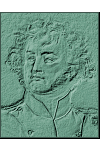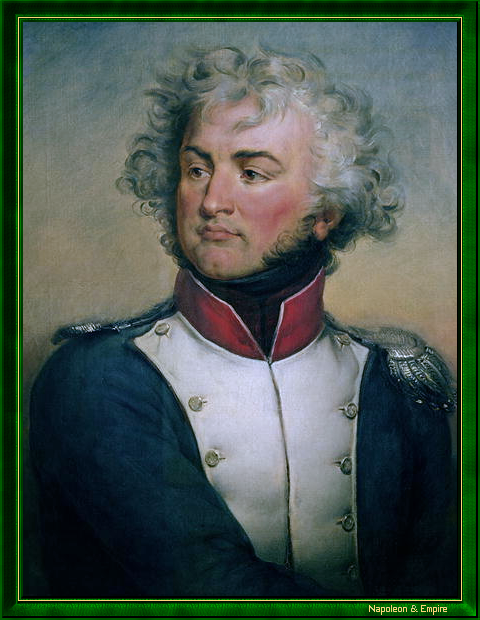General
Pronunciation:

Jean-Baptiste Kléber was born on March 9, 1753 in Strasbourg, at 8, fossé des Tanneurs . He was the son of Reine Bogart and Jean-Nicolas Kléber, who died prematurely just three years after the child's birth. His widow remarried Jean-Martin Burger, another local bourgeois. The stepfather took charge of the boy's education, and he attended the municipal school on rue du Vieux marché aux poissons [now no. 7].
Born into a Catholic family, Jean-Baptiste nevertheless continued his studies at the Jean Sturm gymnasium, a Protestant establishment open to all denominations.
Kléber's first military experience came in 1769. At just 16, he enlisted in the Bercheny hussar regiment (later renamed the 1st hussar regiment after the Revolution). He returned to civilian life less than a year later. The young man resumed his drawing studies (1770-1771), then worked in Paris in the studio of architect Jean-François Chalgrin (1772-1774). In Paris, aided by his height and presence, he acquired a dissipated, even debauched lifestyle. Indeed, he always retained a pronounced taste for female conquests, seemingly concerned more with quantity than quality. At the time, these principles led him into debt. His parents cut him off and called him back to them.
In 1777, Kléber joined the Bavarian army again, as a cadet at the military academy in Munich [München]. He then joined the Austrian army (October 1, 1777). Promoted to second lieutenant in April 1779, he still held this rank in 1783. This was the second time he had given up soldiering, as his rotundity, bad temper and lack of major conflict offered no prospect of rapid career advancement. During his years of service, he experienced little more than garrison life in Mons, Mechelen and Luxembourg. They were briefly interrupted in 1778-1779 by the War of the Bavarian Succession, sometimes referred to as the "Potato War", as the lack of supplies caused more casualties than operations.
He returned to architecture, and in October 1784, thanks to his half-brother François Martin Burger, was appointed inspector of public buildings in Belfort, a position he held under various names until 1792.
In this capacity, he designed a hospital for the town of Thann, which later became the town hall. The Château de Grandvillars and the Canons' House in Masevaux were also built under his direction.
From the outset of the French Revolution, Kléber was an ardent supporter. In the early years, however, he and his friends were content to enthusiastically embrace the new ideas, without leaving his home province. When it came to organizing the first volunteer battalions, he neglected to seek command, despite his background which seemed to make him well-suited for the role. His lack of resources - his position as architect of public buildings in the Haut-Rhin region earned him almost nothing - finally led him to apply for a position as adjutant-major in one of these units. At the request of some of Kléber's friends, General Georges-Félix de Wimpfen granted him the position. Integrated into the 4th Battalion of the Haut-Rhin, whose commander was in his eighties and to whom he had been recommended, Kléber soon exercised full authority, which was not without its share of quarrels with the second-in-command. Kléber's career was punctuated by the kind of quarrels associated with his volcanic temperament and high opinion of himself.
His battalion was sent to Mainz, where he was part of the detachment left there by General Adam-Philippe de Custine to guard the town. There, he won the appreciation of the representatives on mission: Jean-François Rewbel and Antoine Merlin, known as de Thionville. He was promoted to adjutant-general during the siege. But after the garrison surrendered on July 23, 1793, the Convention ordered the arrest of all its leaders. Kléber was included in the batch, before the assembly rescinded its decree and voted that the army had well deserved its country.
Shortly afterwards (August 17, 1793), Kléber was appointed brigadier general and sent to the Vendée with the defeated contingents, as the defeated of Mainz could no longer, under the terms of the capitulation, fight on the frontier. In the meantime, however, he had courageously testified in defense of General Custine before the Revolutionary Court, who was nonetheless condemned to death.
In the west, where he led the vanguard of the Mainz army, Kléber stayed for just over nine months. His first defeat was at the battle of Torfou, where he was wounded. But he went on to win the battle of Cholet (the second of its kind, fought on October 17, 1793). In fact, he took command from his notoriously incompetent general-in-chief, Jean Léchelle. The number of troops involved in this confrontation was the highest of the entire conflict. The Republican army suffered another serious defeat a week later at Entrammes. Kléber, who bore some responsibility for this failure, due to his unwillingness and slowness in carrying out orders, cleared his name by denouncing his leader's imperiousness in a letter to the Comité de Salut Public. Léchelle was dismissed (he died in prison after a few days, for an unknown reason). A new defeat occurred at Dol on November 22, after François-Joseph Westermann's plan was preferred to Kléber's. The latter arrived too late to take an active part in the battle. The latter arrived too late to take an active part in the Le Mans victory, at the end of which he tried to limit the massacres. He did, however, play a major role in the victory at Savenay, which definitively annihilated the Vendée army (at the cost of a few mass executions). At the end of 1793, Kléber assumed interim command of the Army of the West after the departure of François Séverin Marceau. He then spent time in Brittany until May 1794.
After his appointment to the rank of division general on 9 Floréal, Year II, he was sent to the Armée du Nord, before joining the Armée de Sambre-et-Meuse. Under Jean-Baptiste Jourdan, he played a key role in the Fleurus victory, commanding the French left wing. He then defeated the Austrians at Marchiennes, captured Mons and expelled the enemy from Louvain and the Iron Mountain. His success continued with the capture of Maastricht (November 4, 1794).
The Comité de Salut Public (Public Safety Committee) then gave him command of the blockade of Mainz, without providing him with the means commensurate with his task. Kléber invoked health reasons to obtain his replacement and regain his place in the ranks of the Sambre-et-Meuse army.
When the latter began its major offensive in autumn 1795, he crossed the Rhine at the head of his division on September 5 (19 fructidor an III) and captured Düsseldorf the following day. His victorious battles - at Altenkirchen (twice), on the Lahn, at Rednitz - and the capture of Frankfurt [Frankfurt am Main] further enhanced his reputation. The rest of the Year IV campaign, during which Kléber temporarily replaced Jourdan, proved less glorious. It ended in a retreat for which the Directoire took pains to blame the generals. Kléber, who had nothing but contempt for the political staff in place, was not one to take blame lightly. He offers his resignation. It was accepted.
Kléber ran unsuccessfully in the Haut-Rhin elections of Year VI. Defeated, he retired to the outskirts of Paris, to Chaillot. Napoleon Bonaparte drew him out of retirement in 1798 to take part in the Egyptian expedition.
Wounded in the head during the capture of Alexandria (July 2, 1798), Kléber was given command of the town, which he retained until his departure for Cairo [Al-Qāhira] in October.
In February 1799, he led the vanguard of the Syrian expedition. In this position, he made a major contribution to the capture of El-Arich.
In front of Saint-Jean d'Acre [Akko], he led an observation corps which found itself in a delicate situation when it was sent to rescue Jean-Andoche Junot from the enemy bands infesting the hinterland. Bonaparte's arrival saved him from succumbing to his numbers at the battle of Mont-Thabor. During the retreat that soon followed the failure to take Acre, Kléber was put in charge of the army's rearguard.
When Napoleon left Egypt on August 22, 1799, he handed over command-in-chief to Kléber. After his surprise, Kléber complained in a letter to the Directoire, accusing his former superior of having squandered army funds and exhausted the country with his requisitions.
Yet he himself had no hesitation in crushing the Egyptians, particularly the Copts, with taxes, and proved a much more rigid and harsh master than Napoleon.
Convinced that he could not maintain the conquest of his predecessor, he first sought to negotiate the evacuation of the country and signed the Convention of El-Arich with Commodore Sidney Smith, the English plenipotentiary (January 24, 1800). But Smith's superiors, in this case Admiral George Keith, demanded at the last moment the outright surrender of the army to honor their signature. Kléber refused, and announced his decision with the following words, engraved on the base of his monument in Strasbourg's Place Kléber: "Such insolence can only be met with victory; soldiers, prepare to fight. A few days later, he defeated the Ottomans at the Battle of Heliopolis.
He then regained control of Upper Egypt and rebellious Cairo. But on June 14, 1800, after reviewing the Greek legion on the island of Raoudach, Kléber was assassinated on his return to Cairo. A 23-year-old Syrian student, Soleyman ben Mouhammad Amine el-Halaby, disguised himself as a beggar to approach him and struck him in the heart with a stylet. The murderer was condemned by a council of war. After having witnessed the beheading of his accomplices (carried out with a scimitar according to local custom), his right hand was burned off before he was subjected to the torture of the palm. He endured all this with a courage and composure that Dominique Larrey attests to in his account of the Egyptian expedition. Command-in-chief fell to General Jacques-François Menou, known as Abdallah Menou since his conversion to Islam.
After being embalmed by Larrey in Egypt, Kléber's remains were repatriated to France when the French left the country. They then spent a long time at the Château d'If, opposite Marseille, before Louis XVIII had them transferred to Strasbourg. A vault topped by a bronze statue was built in the middle of the city's Place d'Armes to house them. It was inaugurated on June 14, 1840, forty years to the day after the general's death.
Jean-Baptiste Kléber, lieutenant-colonel in the 4th battalion of Haut-Rhin in 1792 (1753-1800), oil on canvas by Paulin-Guérin

His contemporaries, first and foremost Napoleon, painted a contrasting picture of Kléber. According to them, he sought glory as a gateway to pleasure. Brutal and superb, he could only obey a government that imposed its will upon him, and he would probably have served a foreign country as well as his own. Incapable of prolonged and sustained effort, he excelled only on important occasions when his genius was awakened.